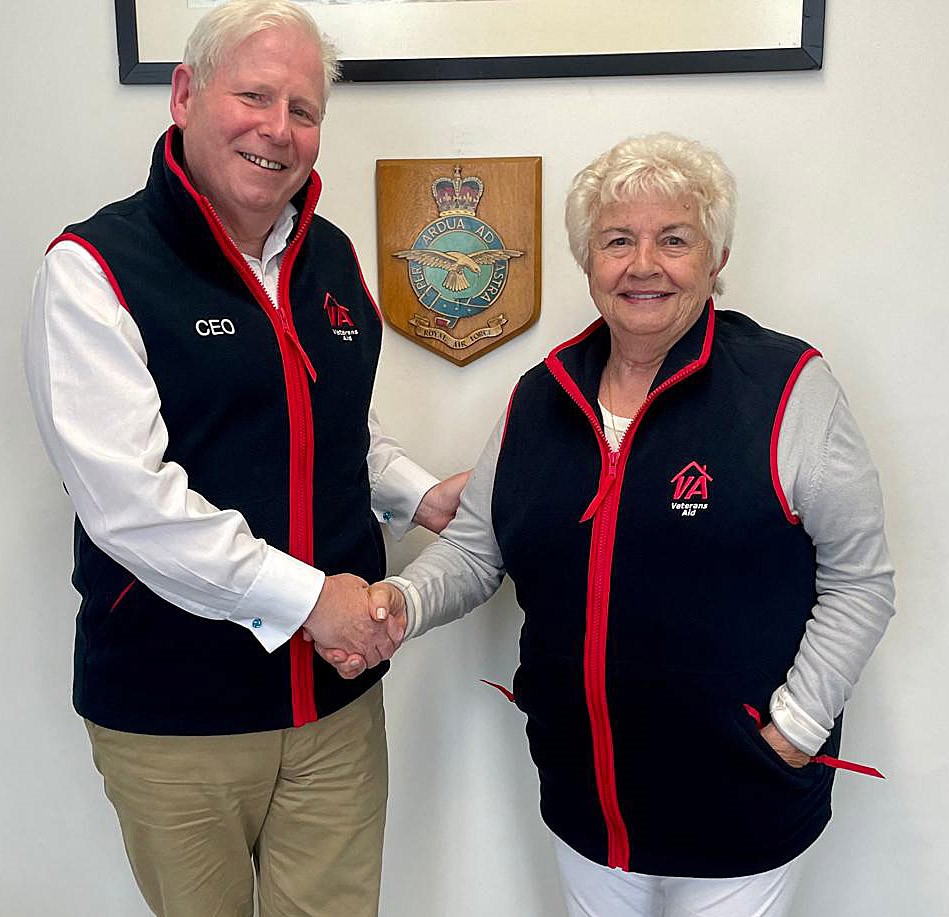Visiting Rotarian hails Veterans Aid model

Veterans Aid welcomed a visitor from France when Rotarian Eileen Hawkins Ferrand called at the charity's HQ /Operations Centre to discuss care for veterans in adversity. Eileen, who is a member of the Rotary Club of La Motte International, near Saint Tropez, was on a fact-finding visit about the charity's Welfare to Wellbeing© model.
The connection came about as a result of VA's increasingly international reputation as Eileen explained: "I was in Adelaide to see my cousin, Dr Nick Ford, and through him I met David Everitt of South Australia Welfare. He told me that Dr Hugh Milroy, CEO of Veterans Aid, was the person I should see and, as I was coming to London in July, we arranged a meeting."
After Dr Milroy's briefing about VA and its work Eileen said: "It was a revelation: his no-nonsense attitude, his accent on prevention, the fact that his Welfare to Wellbeing© method has turned around the lives of over a thousand people - it was amazing. I just hope we can replicate it for our French veterans. We are holding a symposium in La Motte en Provence in Autumn 2024and Dr Milroy has kindly accepted our invitation to preside."
Dr Milroy, who in addition to being VA's CEO is an Honorary Professor of Social Work at the University of East Anglia and Head of Wellbeing at the World Veterans Federation, said: "It was a pleasure to spend time with Eileen, tell her more about the work of the charity and illustrate how the Welfare to Wellbeing© model underpins everything we do here. She also expressed interest in our 66-room residential facility, New Belvedere House, which was reopened by the Mayor of London in 2018 after extensive refurbishment. That, too, was designed around delivery of the Welfare to Wellbeing© process - residents at NBH follow a pathway that guides them from dependence and social isolation towards empowerment and independence."
The Rotary Club of La Motte International in Southern France, created in 2020, is made up of British and American members and meetings are held in English and in French. Eileen said: "A subject close to our hearts is that of 'Vétérans OPEX', an association that takes care of other veterans who are sleeping rough; these are ex-servicemen, many suffering from PTSD and other related psychiatric issues, for whom there is no rehabilitation safety net and who are only a step away from destitution. France has excellent facilities for its active service personnel and those who have recently left the services. However, for those whose problems arise years after leaving, there is no provision."
Although not a veteran herself Eileen has close connections to the military community. Her husband Jacques, who died in 2017, was a veteran who served in Algeria. Her elder brother served in Palestine and also in the Metropolitan Police Force for many years. The wellbeing of veterans is a subject close to her heart.
"In July 2018, I learned of the death on the street of 47-year-old Daniel Crépet a recipient of the Croix de Guerre. If a local councillor had not recognised him, he would have gone to a common grave. As it was, CARAC, a veterans' insurance organisation, funded a decent funeral for him. In the extremely wealthy town of Saint Raphaël, for example, there is an OPEX veteran with Delirium Tremens living alone in a caravan. Association members bring him food and comfort, as far as they can. What is needed is support, to get him into hospital, calm him and start a process of engagement."
Citing the ancient Greek ethos of veterans' support Eileen sums up her own attitude: "Communities send their armies to war and therefore have a duty to receive, even welcome them, back into the community. We have a duty of care to those men and women who have loyally served their country."
Dr Milroy said: "Increasingly, through my role with the World Veterans Federation, I am conscious of the universality of veterans' problems. Just as they are united by the experience of service, they are united in adversity. Poverty is a great leveller and basics like housing, employment and food can no longer be taken for granted. In every country there are veterans struggling, not just with the legacy of conflict such as mental and physical health problems, but with the daily battle to thrive in a hostile economic climate. It has never been more important for organisations - and nations - to work together and share best practice."
